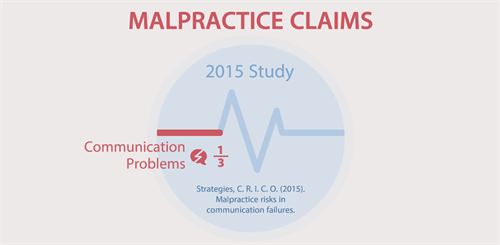Q&A With Dr. Cynthia Clark on New Civility Mentor Simulations

(Did you just roll your eyes?)
In all seriousness, a colleague’s look of disdain or contempt may seem innocuous. But it absolutely is not.
Eye rolling is just one — among many — uncivil behaviors that may contribute to unhealthy or toxic workplaces. And research has proven that such environments in healthcare can have dangerous consequences for patients, including harm, injury, or even death.
So how does one address such a serious issue? For more than two decades, that question has been the life’s work of Cynthia Clark, PhD, RN, ANEF, FAAN, Strategic Nursing Advisor for ATI Nursing Education.
And, she finally found a solution.
For the past year, Dr. Clark has led a team of instructional designers, psychometricians, and computer programmers to address the issue of civility. Their goal? To create an interactive and engaging learning solution that will give nursing students the skills to:
- Engage in difficult conversations with colleagues and preceptors
- Foster civility and healthy work environments.
Q1. Incivility has been a problem in nursing and healthcare for a long time. Why now with this solution?
Dr. Clark: Delivering safe patient care is, unequivocally, one of the most important aspects — and perhaps the most important aspect— of every healthcare professionals’ work.Safe patient care is heavily reliant on 3 things:
1. Efficient team performance
2. Effective, respectful communication
3. The ability to constructively address and manage conflict with healthcare colleagues, patients, and their families.
Nursing is a high-stakes, high-stress profession. Nurses and other healthcare professionals continually face challenging situations in their jobs. Even so, regardless of clinical specialty or work setting, all nurses have a professional and ethical obligation to foster civility and promote healthy work environments. This requires a commitment to teamwork, collaboration, and patient safety.
If it’s not immediately obvious how civility ties to patient safety, let me explain.
-
Uncivil encounters can:
- Weaken a nurse's self-confidence
- Impair critical thinking and clinical judgment
- Diminish a nurse's capacity to speak up and advocate for patient safety
- Lead to uncertainty and self-doubt.
And, in fact, if poorly managed? Incivility in healthcare can lead to life-threatening mistakes, preventable complications, harm, or death of a patient. Those are very scary — and very preventable! — risks.
Plus, the body of science on workplace civility, incivility, bullying, and other forms of workplace aggression continues to grow. At the same time, several national nursing organizations are issuing a “call to action” to address these challenging issues.
So, clearly, we need innovative and evidence-based strategies to prepare nursing students to foster civility and healthy work environments. We need them to be able to address acts of incivility that compromise teamwork and threaten coworker and patient safety.
The safe delivery of optimal patient care depends on their mastery of these vital skills.
With all that in mind, we began developing Civility Mentor. It’s truly unique in being an interactive learning experience for students. We designed it to educate them about the consequences of incivility. But we also wanted them to be able to develop and practice the essential skills needed to foster civility, communicate more assertively, and work collaboratively in interprofessional healthcare teams.
Patient safety is simply too important for us to sit back and ignore the problem.
Q2. What were your initial thoughts about how to address the issue of civility?
Dr. Clark: Fostering civility and healthy work environments has been the focus of my body of research for nearly two decades. My mission — which I crafted nearly a decade ago:
Leading the coalition for change: Creating and sustaining communities of civility.
I take this mission very seriously. For nearly 20 years, I’ve been researching and presenting on these topics. My audiences have been diverse — faculty, students, practicing nurses, physicians, and other healthcare professionals — in venues large and small across the country.
For a long time, I dreamed about creating a product with a leading-edge company that could help with this issue.
The solution to teaching and learning civility would have to be:
- Realistic and relevant
- Scientific and evidence-based
- Positively focused
- Interactive and engaging
- Concentrated on critical areas:
• Building high-performing teams
• Communicating assertively and effectively
• Negotiating conflict in a productive way
• Coalescing around a unifying goal of achieving excellent patient care.
And here we are!
The team that created Civility Mentor is exceptional in every way. They are creative, brilliant, top performers who are dedicated to creating a high-quality product.
What’s especially helpful to educators is that Civility Mentor can be used by literally thousands of learners at any given time. Students can simultaneously be learning and practicing essential skills to foster civility, professionalism, ethical practice, and safe patient care.
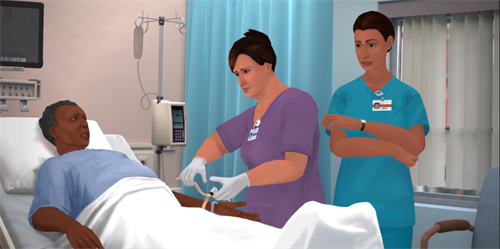
Q3. What specific aspects of civility did you feel must be included in developing this tool?
Dr. Clark: We had several in mind. We knew it had to address patient safety, reflective practice, perspective taking, building empathy, and understanding the importance of norm-setting to support safe patient care.
But we wanted the tool to go even deeper — to include the inextricable link between stress and incivility.
Then, we incorporated topics related to resilience, self-care, healthy coping, and professional well-being.
And, what I really love? Civility Mentor provides a completely safe learning platform. Students can practice and master the concepts without fear of judgment or making mistakes. They learn how to manage conflict and communicate effectively in challenging situations — situations that are common in healthcare environments.
I also love how Civility Mentor gives learners opportunities to develop and use evidence-based approaches.
- The proven techniques that Civility Mentor employs will help learners:
- Prevent and address uncivil behavior
- Initiate conversations to constructively resolve conflict
- Advocate for safe patient care.
Q4. How exactly does Civility Mentor achieve all that?
Dr. Clark: Civility Mentor incorporates a variety of techniques, as does the Lesson Plans that come with it. For example: cognitive rehearsal.
Research has shown that if we combine cognitive rehearsal with evidence-based scripting — all within a deliberate practice model — and then add skilled debriefing, we’ll achieve an effective, comprehensive approach. This combination gives nursing students the essential skills to effectively address uncivil encounters.
Civility Mentor also uses role-playing. Again, research has proven this technique’s effectiveness. When we role-play actual scenarios, we provide nursing students with real-life experiences that truly help them effectively address incivility and similar challenging encounters.
And, finally, the debriefing I mentioned. That’s the final piece to the solution. Debriefing creates safe spaces for reflective practice and for exploring effective ways to address future situations.
So, all of these aspects are critical to making Civility Mentor impactful.
But what’s especially key for Civility Mentor in driving learner success is its ability to allow for dosing, repetition, and coaching.
Students require repetitive practice of various experiences, but it must be accompanied by skillful coaching. With repeated practice sessions in a variety of situations, student responses are more likely to become automatic.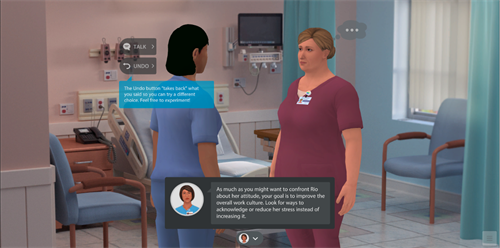
Q5. Is Civility Mentor only impactful in clinical settings or can it help create a healthy academic environment?
Dr. Clark: Absolutely!
We know how stressful pursuing a nursing degree can be. Students have to master difficult course material, pass high-stakes exams, perform complex clinical skills — it all exacts a real emotional toll on them! Then, throw in trying to balance school with work, family, and life responsibilities.
That’s a lot of pressure!
It’s true that some amount of stress can be motivating. But higher levels of stress coupled with ineffective coping can lead to real problems — both in physical and emotional ill health.
So, knowing this is such a common situation for nursing students, we built a module of Civility Mentor that simulates that experience. In it, two nursing students are talking. One is highly stressed by the demands of nursing school, and the other student tries hard to offer support. She suggests ways to cope in a healthy manner, and she gives her classmate helpful information about accessing campus resources.
The simulation is so topical and immediately beneficial!
The simulation between students can help them:
• Recognize stress associated with nursing school
• Communicate with peers about effective ways to manage stress
• Utilize healthy coping strategies.
We’re very excited to see some real improvement in students’ quality of life when they begin learning the skills that Civility Mentor can teach them!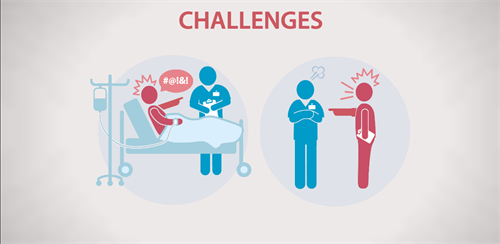
Q6. Okay, getting back to the clinical environment — how specifically does the Civility Mentor help?
Dr. Clark: Civility Mentor’s online platform allows learners to practice the types of challenging and crucial conversations they’re likely to face with healthcare professionals outside the classroom. What’s really great is they can practice without fear of making a poor choice or embarrassing themselves, because all of their virtual interactions — with peers, clinical preceptors, charge nurses, etc. — all take place in the privacy of their home or office or library — wherever their learning environment is.
Plus, the simulations are so authentic. They depict real-life scenarios that occur in health care settings.
But Civility Mentor is much more than the simulations. It also provides faculty with empirical, evidence-based lesson plans, education guides, and resources focused on topics, such as:
• Civility education
• Appreciative inquiry
• Effective communication
• Principled negotiation
• Professionalism
• Empathy
• Ethical practice
• Conflict negotiation.
One of the greatest challenges in healthcare is speaking up, advocating, and addressing conflicted situations — especially when patient safety is at stake. And this is especially true when you’re in the presence of a real or perceived power gradient. For example, Module 4 illustrates how a conflict between a newly graduated nurse and his charge nurse can be effectively negotiated following a less than optimal interaction that occurred the day before.
It takes courage to engage in challenging conversations — and even more so when you’re speaking to a supervisor.
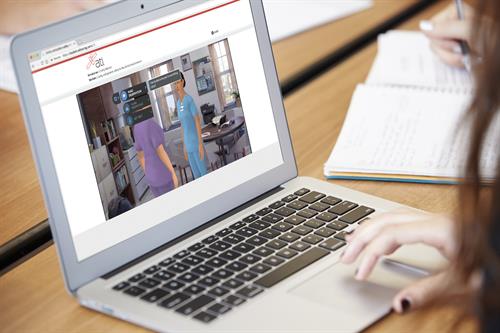
Q7. This all sounds great. But is it really realistic to expect someone who isn’t naturally outspoken to speak out against incivility?
Dr. Clark: Yes, it’s realistic, and it’s vitally important.
We developed Civility Mentor to provide learners with real-life opportunities to practice conflicted encounters and address uncivil interactions. Its development was predicated on the belief that being well-prepared, speaking with confidence, and using respectful expressions to address incivility can empower nursing students to speak up and address uncivil behaviors.
So, Civility Mentor provides students with a safe learning environment to practice dealing with potentially stressful situations. They repeatedly rehearse a stressful situation to achieve a favorable outcome, which makes them well-prepared to deal with incivility and heightens the potential for a successful outcome — and that’s because the learner has thoughtfully prepared for and repeatedly practiced the encounter.
It is imperative that we all understand the nature of workplace incivility so that we can prevent and effectively address the problem. Being treated in an uncivil manner changes an individual’s natural neurobiological state, and the impact of this can be felt instantly. Some individuals flush, sweat, get angry or tear up, or worse, they become silent. Others can’t stop thinking about the exchange and wish later they had addressed the offender. These reactions call for an intervention, because the longer the clock ticks after an uncivil assault, the greater the potential for negative consequences to occur.
Civility Mentor helps learners effectively communicate and deliver a respectful message to colleagues, peers, and coworkers. Being well-prepared, speaking with confidence, and using respectful expressions to address incivility can empower nurses to break the silence of incivility.
Learn more about Civility Mentor.
Read more about civility:

